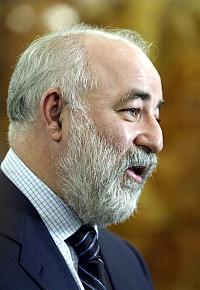
GAZPROM’S CLOCK TICKING ON BP’S KOVYTKA PROJECT
Publication: Eurasia Daily Monitor Volume: 4 Issue: 21
By:

Gazprom and the Kremlin look poised for another forced takeover of major Western assets in Russia’s energy sector. On January 29, Nature Inspectorate (RosPrirodNadzor) deputy chief Oleg Mitvol announced that his agency and the Resources Inspectorate (RosNedra) are about to launch the final phase of investigations into TNK-BP’s Kovytka gas project in eastern Siberia. Mitvol is the medium-level official fronting for the Kremlin to intimidate Western companies into ceding their assets to Russian state companies.
Announcing the endgame phase, Mitvol already pronounced TNK-BP guilty of violating the terms of its license at Kovytka. The outcome of the case, he warned, “depends on the way in which TNK-BP will explain its violations” — apparently an oblique indication that the company risks a worse shakedown if it raises a fuss. Russian authorities plan to complete the investigation by March.
The artificially created dispute centers on the company’s failure to launch commercial production at 9 billion cubic meters in 2006. Under the terms of the license, the project’s first phase was to have supplied that volume of gas to consumers in Irkutsk oblast, where Kovytka is situated. TNK-BP was ready to start production at that level in 2006, but — as it turned out — there was no demand for nearly that volume in Irkutsk oblast; and consequently, it made no sense to build a supply pipeline from the field. Accordingly, the company proposed changes to the license last year, but the Russian authorities turned down the proposals.
Kovytka is the richest among Russia’s gas fields that are about to come on stream. It holds proven reserves of 1.9 trillion cubic meters of gas and 115 million tons of condensate. TNK-BP is a 50%-50% joint venture of BP with Alfa Access Renova, an oligarch-controlled group in which Viktor Vekselberg seems to be the dominant shareholder. TNK-BP owns a 62.4% stake in Rusia Petroleum, the operating company at Kovytka. Rusia Petroleum’s other shareholders are the Russian company Interros with 25.8% and the Irkutsk oblast administration with 11.2%.
TNK-BP is said to have paid more than $6 billion for its rights to Kovytka in 2003 (Wall Street Journal, January 29). According to reports from Moscow, TNK-BP seeks to retain a 33% stake in Rusia Petroleum, while Gazprom wants 74.4%. Apparently, Gazprom intends to direct a portion of Kovytka’s anticipated output to Russia’s domestic market immediately and another portion for export to China starting in 2011.
According to Vekselberg, who supervises the Kovytka project as TNK-BP executive director, the Kovytka field and output are to be integrated into Russia’s Single Gas Supply System. Once within that system, decisions would be made regarding the delivery volumes and destinations within Russia and to China, respectively. Thus, “Gazprom’s entry into the project is inevitable, given the project’s structure and logic,” according to Vekselberg on Russian television (August 26). However, such an outcome seemed by no means logical, let alone inevitable, when BP acquired this project in Russia.
On January 29, the Moscow-based Petromir company legally registered its Angarsk-Lensk gas project, located also in Irkutsk oblast. Its holds estimated reserves of 1.3 trillion cubic meters of gas and 70 million tons of condensate, which if proven would come close to Kovytka’s order of magnitude. The Angarsk-Lensk project is situated approximately 100 kilometers from Kovytka and also some 100 kilometers from Sayansk. TNK has long proposed connecting the two by pipeline, and Rusia Petroleum plans to complete a 550-kilometer pipeline, Kovytka-Sayansk-Angarsk-Irkutsk, in the course of 2007 and 2008. The most likely outcome will be Gazprom’s control over both extraction projects, the connecting pipeline, and the commercial decisions about production and deliveries.
TNK-BP seems resigned to ceding its majority stake in Kovytka to Gazprom and is only negotiating about the price. Royal-Dutch Shell, the latest casualty of a Kremlin-driven forced cession to Gazprom, at its Sakhalin-2 project, seemed similarly reconciled after a very brief resistance. Shell president Jeroen van der Veer actually thanked Russian President Vladimir Putin when the ordeal was over last month, with Shell widely believed to have been short-changed by some $5 billion. Last week at the World Economic Forum in Davos, van der Veer appeared on a panel alongside Gazprom leaders and announced that Shell— “satisfied with Gazprom’s entry into the Sakhalin-2” — will continue seeking new investment opportunities in Russia. Apparently, putting the best face on a shakedown is one of Gazprom’s conditions thrown into such deals.
(Interfax, January 25 -29; Kommersant, January 29; see EDM, December 13, 15, January 3)




